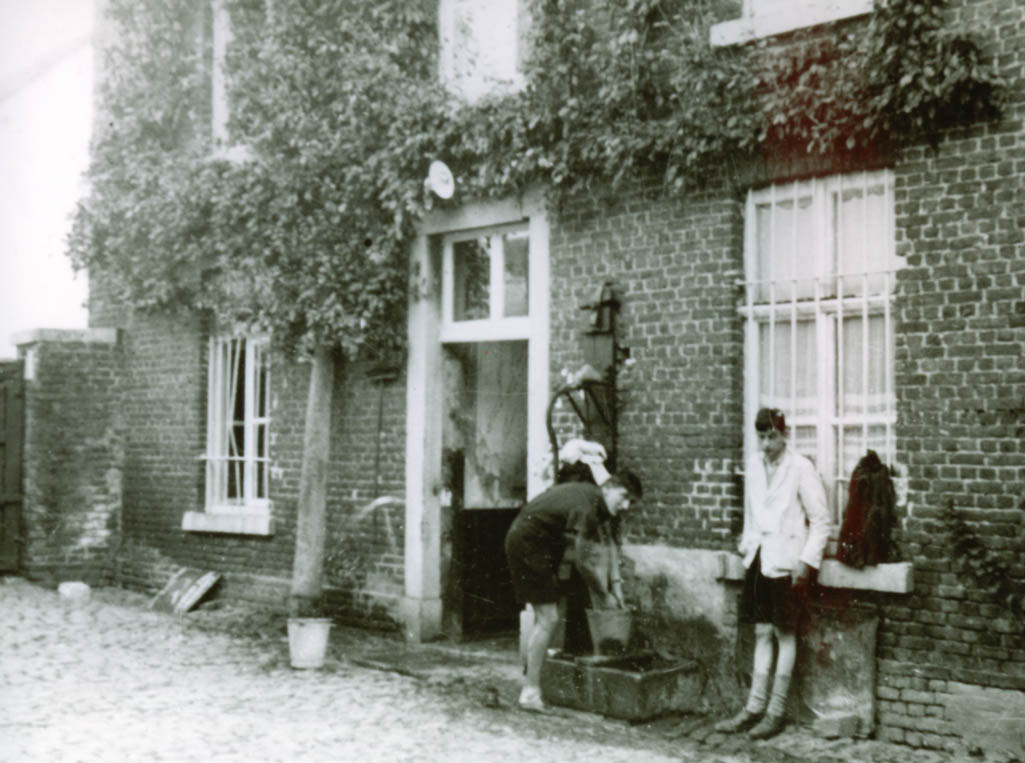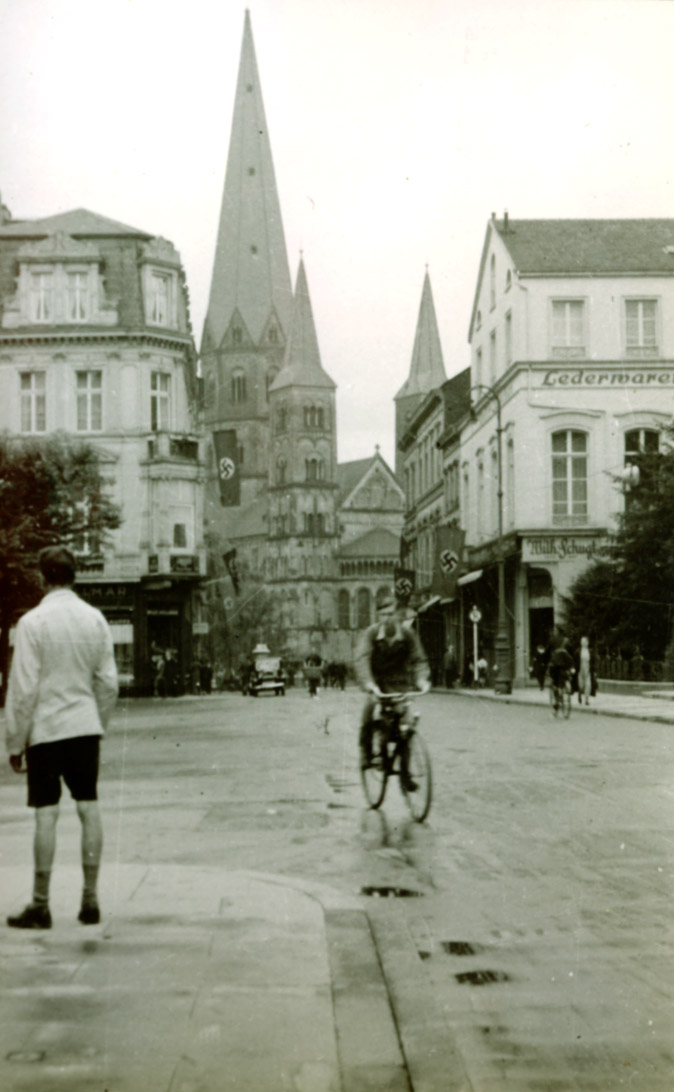Chapter 6: France, Belgium and Germany, 1936
In the summer of 1936 there was time available for a holiday between leaving Woolwich and joining the Royal Signals in Catterick Camp. My father had retired from the Army and moved south. It was time to make my own plans rather than leaning on parental arrangements. The research and planning of an expedition is an enjoyable pursuit in its own right. With my two brothers we would enlarge our knowledge of continental Europe cheaply by bicycle. Nigel, through maternal initiatives, could ride a bicycle but as a registered blind person would need a pilot. With sixteen year old Malcolm taking on this task and Nigel on the rear saddle of a tandem we could manage. Financial planning was tight but we were full of confidence. Much of what memory stores is about the difficult challenges met and how they were overcome.
Arriving in Dunkirk we discovered our first mistake. Had we joined an appropriate Cycle Club we could have brought our bikes into France free. As it was some of our good money went to Customs. We would be very short of cash until we could use tourist Marks on reaching Germany. Starting late we called it a day at some dark Belgian town. A policeman with a large Alsatian stopped us and enquired about our lack of bicycle lights, but politely directed us to the Youth Hostel when we explained what we needed. Youth Hostels, particularly well developed in Germany, served us very well throughout our trip.
Next morning, having acquired a large loaf of bread, our calculations showed that, on a ration of a slice of bread and a small beer every twenty kilometres and very few frills we would be able to reach the German frontier after one more night on the way. In the late afternoon, somewhere between Tienen (Tirlemont) and Sint-Truiden (St Trond), we saw a long line of railway trucks that looked as if they had not moved for a long time. We decided that we were unlikely to come across any better free accommodation, so mentally booked our rooms. For supper finance allowed us each to have one small fish (without any miraculous intervention) followed, when we were bedded down, by the luxury of a small piece of ex-Lax chocolate from the medical kit. We stowed the bicycles with us. If we moved off, at least they would not be lost and we might even travel in the right direction. The cold rather than the fear that the trucks would move pushed us into an early start in the morning. Fortune smiled when we stopped at what was probably a wayside farm. We washed under the pump in the yard and were treated to a breakfast of a boiled egg and plentiful supply of weak coffee. Perhaps we supplied the bread. Our enquiries about what things would cost must have shown that we were broke. I believe that it was entirely through generosity that we were only charged one shilling.

The road was hilly and hard work as we reached Liege, but morale was maintained for the rest of the journey to the frontier town of Aachen by the thought of the riches available to us when we could cash our German marks. Once again the Frontier crossing presented problems. We were asked to declare what money we were taking into the country. We replied honestly that we had none. It was then explained to us that the tourist mark had to be protected and that if we brought no money in we could take no money out. We accepted this arrangement but were taken through the same rigmarole a couple more times before, with a shrug of the shoulders, we were let through.
By train and bicycle we reached Bonn, which gave us our first inspection of Hitler’s Germany. My impression remains of sparkling cleanliness, Swastika flags everywhere and no sign of antagonism to the wandering British. The German Youth were certainly benefiting from what was being provided for them. The inevitability of war resulting from Hitler’s actions was by no means apparent. However dictators, Napoleon and the rest, do tend to overreach. Hitler’s racist theories did show him up in a bad light. This was the time of the 1936 Berlin Olympics and every town was dressed for the occasion. Wherever one went there were displays showing the large number of gold medals the Germans were winning. Their approach was perhaps the first great professional approach to the sport. However the outstanding American sprinter Jesse Owens had given good warning of his prowess the year before when he set six new world records in a period of 45 minutes. He won four gold medals in Berlin and Hitler refused to congratulate him.
Many years later I asked a fellow Signals officer, Crew Stoneley, what the arrangements were for the 1932 games in Los Angeles in which he competed. He said that he had been called to the Adjutant’s office of his unit where he was told of a telephone message asking whether he would be able to take part in the Los Angeles competition. On asking what training he should do he was told to do what he could to keep fit. He won a Silver medal in the quarter mile.
In the Royal Signals Mess in Blandford Camp there is another Olympic trophy, a statue presented by Brigadier Hawtry. It is said that he happened to be in Athens in 1896 and, as a good long distance runner, participated in and won a major distance race, the statue being his prize. He said that his philosophy was that he knew he would feel terrible at some stage of the race and that he must concentrate his thoughts on the fact that those just behind him must feel worse.
In Bonn we were met by arrangement by our skiing self-appointed Hon Godfather, Brian Palmes, who gave a helping hand in our lives now and then. It was a time for catching up on our eating.
One day the great Zeppelin, the Hindenburg, flew over the city - a most impressive sight, majestic and elegant, but a blind alley in the search for better air transport. A year later she burst into flames and was totally destroyed on arrival in New Jersey after an Atlantic crossing.

Moving on to Koblenz, with its bridge of boats which opened at times to let river traffic through and a floating swimming bath in the river, we took a river trip to Mainz, passing the Lorelei cliffs and eventually reaching Frankfurt, the home town of the poet and author Goethe. In a major square we attended a presentation of one of his plays with a cast of thousands. We could applaud it as a spectacle, but with inadequate grasp of the language we did not stay long.
To vary our route we left the Rhine to go up the Mosel (Moselle) valley that was quieter, more rural and relaxed than the Rhine. We had written home asking that some money should be sent to the youth hostel in Prüm, last call before re-entering Belgium. We were into hilly country once more and struggled on, Cointreau being our more refined stimulant at our 20km halts at this stage. The response to our message was awaiting us.
Prüm was nice but we were running late and set off to cover 100 miles through the hilly Ardennes to Phillipeville. It was a magnificent area with fine trees and good mountain roads as we pedalled hard all day. Heavy rain drenched us in the latter part of the journey and I remember great efforts to make myself tidy and presentable before going into an inn to ask for a room. My brothers waited outside in the rain until the booking was confirmed. If the rain had been snow I could imagine, when the time came, how difficult conditions must have been during the final offensive by the Germans in the Ardennes.
Our last overnight stop was in Ypres and memory tells me that war damage was still much in evidence. We attended the moving Last Post ceremony at the Menin Gate, which at that date may well have been performed by true veterans of the Great War, as one used to call World War I.
By mid morning next day we were back at Dunkirk - flat broke after buying a cheap bag of plums and with half a day until our boat was due to sail. Others have memories of the beaches of Dunkirk. We were as relieved as any of them when we got on the channel ship.
Our last worry was over when we saw our parents waiting for us at Folkestone the next morning. The magnificent breakfast in the hotel overlooking the harbour held a permanent place in our memories. Parental comment was only that we were rather dirty. We had not had much time for laundry. The only long term sufferer was Malcolm, some of whose fingers remained numb for several months after the constant shaking when guiding the tandem over rough pavé in many of the continental towns.